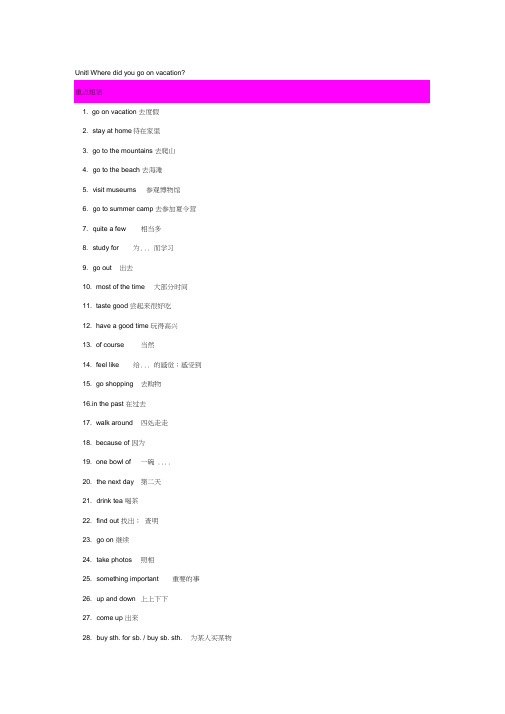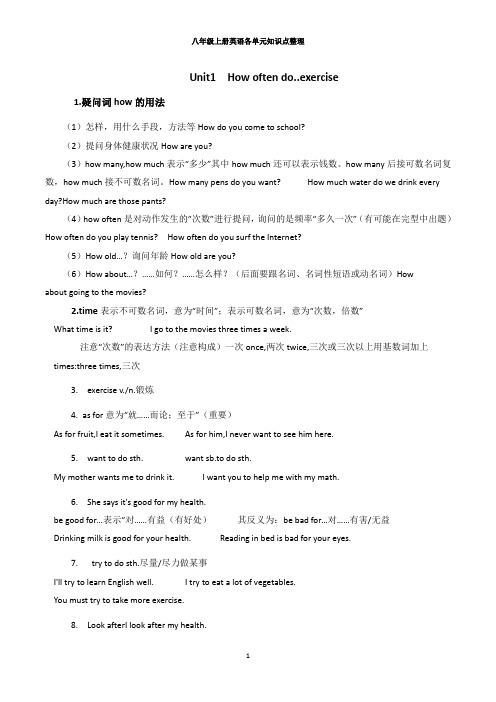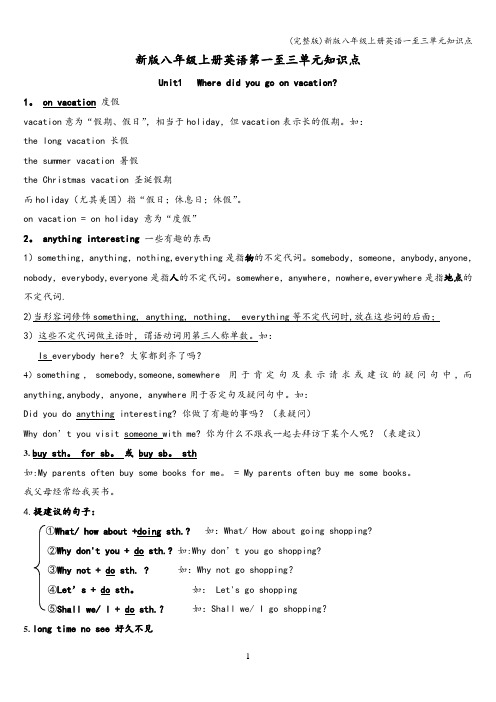(完整版)新版八年级上册英语一至三单元知识点
(完整word版)八年级上册UNIT1-3知识点总结,推荐文档

Unitl Where did you go on vacation?1. go on vacation 去度假2. stay at home 待在家里3. go to the mountains 去爬山4. go to the beach 去海滩5. visit museums 参观博物馆6. go to summer camp 去参加夏令营7. quite a few 相当多8. study for 为... 而学习9. go out 出去10. most of the time 大部分时间11. taste good 尝起来很好吃12. have a good time 玩得高兴13. of course 当然14. feel like 给... 的感觉;感受到15. go shopping 去购物16.in the past 在过去17. walk around 四处走走18. because of 因为19. one bowl of 一碗 ....20. the next day 第二天21. drink tea 喝茶22. find out 找出;查明23. go on 继续24. take photos 照相25. something important 重要的事26. up and down 上上下下27. come up 出来28. buy sth. for sb. / buy sb. sth. 为某人买某物29. taste + adj. 尝起来.....30. look+adj. 看起来...31. nothing…but+动词原形除了... 之外什么都没有32. seem+ (to be) + adj. 看起来.........33. arrive in+ 大地点/ arrive at+小地点到达某地34. decide to do sth. 决定去做某事35. try doing sth. 尝试做某事/36. try to do sth. 尽力去做某事37. forget doing sth. 忘记做过某事/38. forget to do sth. 忘记做某事39. enjoy doing sth.喜欢做某事40. want to do sth. 想去做某事41. start doing sth. 开始做某事42. stop doing sth. 停止做某事43. dislike doing sth.不喜欢做某事44. keep doing sth. 继续做某事45. Why not do. sth.? 为什么不做...... 呢?46. so+adj.+that+从句如此......... 以至于....47. tell sb. (not) to do sth.告诉某人(不要)做某事48 .have a good time=enjoy oneself=have fun(doing sth.) 玩得痛快复合不定代词或副的构成及用法构成:由some, any, no, every分别加上-body,-thing,-one 构成的不定代词叫做合成不定代词;加上-where 构成副词。
(完整版)八年级上册英语各单元知识点

Unit1 How often do..exercise1.疑问词how的用法(1)怎样,用什么手段,方法等How do you come to school?(2)提问身体健康状况How are you?(3)how many,how much表示“多少”其中how much还可以表示钱数。
how many后接可数名词复数,how much接不可数名词。
How many pens do you want? How much water do we drink every day? H ow much are those pants?(4)how often是对动作发生的“次数”进行提问,询问的是频率“多久一次”(有可能在完型中出题)How often do you play tennis? How often do you surf the Internet?(5)How old…?询问年龄How old are you?(6)How about…?……如何?……怎么样?(后面要跟名词、名词性短语或动名词)Howabout going to the movies?2.time表示不可数名词,意为“时间”;表示可数名词,意为“次数,倍数”What time is it? I go to the movies three times a week.注意“次数”的表达方法(注意构成)一次once,两次twice,三次或三次以上用基数词加上times:three times,三次3. exercise v./n.锻炼4. as for意为“就……而论;至于”(重要)As for fruit,I eat it sometimes. As for him,I never want to see him here.5. want to do sth. want sb.to do sth.My mother wants me to drink it. I want you to help me with my math.6. She says it's good for my health.be good for…表示“对……有益(有好处)其反义为:be bad for…对……有害/无益Drinking milk is good for your health. Reading in bed is bad for your eyes.7. try to do sth.尽量/尽力做某事I'll try to learn English well. I try to eat a lot of vegetables.You must try to take more exercise.8. Look afterI look after my health.My brother is ill. I have to look after him today.He often helps his mother look after his little sister.9. help sb.(to)do sth.帮助某人做某事(to大多都是省略)My healthy lifestyle helps me get good grades. She often helps me learn math.10. the same as…与……一样Is her lifestyle the same as yours or different?She looks the same as her sister.11. I think I'm kind of unhealthy.kind of=a little有点儿(重要短语);a kind of一种12. although=thoughAlthough he's ill,he goes to school on time.13. keep in good health(重点掌握)=keep healthy=stay healthykeep+形容词表示保持某种状态A lot of vegetables help you to keep in good health.Keep quiet!The baby is sleeping. We must keep our classroom clean14. That sounds interesting.look(看起来),sound(听起来),smell(闻起来),taste(尝起来),feel(觉得),seem(好象),grow(变得),get(变得)等词在英语中可用作系动词,后跟形容词作表语。
(完整版)新版八年级上册英语一至三单元知识点

新版八年级上册英语第一至三单元知识点Unit1 Where did you go on vacation?1。
on vacation度假vacation意为“假期、假日”,相当于holiday,但vacation表示长的假期。
如:the long vacation 长假the summer vacation 暑假the Christmas vacation 圣诞假期而holiday(尤其美国)指“假日;休息日;休假”。
on vacation = on holiday 意为“度假”2。
anything interesting 一些有趣的东西1)something,anything,nothing,everything是指物的不定代词。
somebody,someone,anybody,anyone,nobody,everybody,everyone是指人的不定代词。
somewhere,anywhere,nowhere,everywhere是指地点的不定代词.2)当形容词修饰something, anything, nothing, everything等不定代词时,放在这些词的后面;3)这些不定代词做主语时,谓语动词用第三人称单数。
如:Is everybody here? 大家都到齐了吗?4)something,somebody,someone,somewhere用于肯定句及表示请求或建议的疑问句中,而anything,anybody,anyone,anywhere用于否定句及疑问句中。
如:Did you do anything interesting? 你做了有趣的事吗?(表疑问)Why don’t you visit someone with me? 你为什么不跟我一起去拜访下某个人呢?(表建议)3.buy sth。
for sb。
或 buy sb。
sth如:My parents often buy some books for me。
八年级上册英语一到三单元笔记

八年级上册英语一到三单元笔记Unit 1 Where did you go on vacation?一、重点单词。
1. anyone.- 词性:代词,意为“任何人”,常用于疑问句和否定句中。
例如:Did you meet anyone interesting on your vacation?(你在假期遇到有趣的人了吗?)2. anywhere?- 词性:副词,意为“在任何地方;无论何处”。
例如:I can't find my keys anywhere.(我到处都找不到我的钥匙。
)3. wonderful.- 词性:形容词,意为“精彩的;绝妙的”。
例如:We had a wonderful time at the beach.(我们在海滩度过了一段美妙的时光。
)4. few.- 词性:形容词,意为“很少的;不多的”,修饰可数名词复数,表示否定意义。
例如:There are few apples on the tree.(树上几乎没有苹果了。
)- 区别于“a few”,“a few”表示“一些;几个”,有肯定意义。
例如:There are a few students in the classroom.(教室里有几个学生。
)5. most.- 词性:形容词,意为“大多数的;大部分的”。
例如:Most students like English.(大多数学生喜欢英语。
)- 也可作名词,意为“大多数;大部分”。
例如:Most of the time, I stay at home.(大部分时间,我待在家里。
)6. something.- 词性:代词,意为“某事;某物”,常用于肯定句中。
例如:I have something to tell you.(我有某事要告诉你。
)- 区别于“anything”(用于疑问句和否定句)和“nothing”(意为“没有什么;没有东西”)。
例如:Do you have anything to drink?(你有什么喝的东西吗?)There is nothing in the box.(盒子里什么都没有。
八年级英语上册Units1-3知识归纳(通用3篇)

八年级英语上册Units1-3 知识归纳(通用3篇)八年级英语上册Units1-3 知识归纳篇1八年级上册units 7—9 知识归纳一、词语辨析:1、win, beat二者都有“打赢;取胜”之意,但宾语不同:win后面所接的宾语一般是指一场比赛、一场辩论或一次战斗等等。
如:he came first and won the race.他跑在最前面,赢得了这场比赛。
beat后面所接的往往是比赛、辩论或战斗的对手,即宾语通常是人。
如:the girls' team beat us in the football match.在那场足球比赛中,女子队打败了我们。
i’m sure jim will win the match.we won the first place in the sports meeting. 我们赢了第一名。
i’m afraid they will beat us.i hope we can beat t he boys’ team. (男子队,相当于人。
)2、join, join in, take part in1)加入某党派、某组织或某社会团体,用join,不可用join in。
如:①he will never forget the day when he joined the party.他永远也忘不了他入党的那一天。
②his brother joined the army three years ago.他哥哥是三年前参军的。
join还可解释为“连接”。
如:①the railway joined the two cities.铁路把两个城市连接起来了。
②the two clauses are joined by a conjunction.两个分句由一个连词连接起来。
2)说参加某种活动用join in,如说“与其人一起做某事”,则用join sb. in sth. / doing sth. 。
英语八年级上册1~3单元知识点

英语八年级上册1~3单元知识点一、单元一:Hello !1. 问候和自我介绍1.1 问候语在日常交流中,问候是非常基础而且重要的部分,例如:Hello!Hi!Good morning/afternoon/evening!1.2 自我介绍当你第一次见到某人时,你需要用英语介绍自己,包括自己的尊称、芳龄、爱好等信息。
例如: My name is Tom. I'm 14 years old. Ilike playing basketball and listening to music.2. 询问及回答2.1 询问对方的尊称和芳龄询问对方的尊称和芳龄是交流中的基本内容,例如:What's your name? How old are you?2.2 回答询问当他人询问你尊称和芳龄时,你需要会做简单而又礼貌的回答,例如:My name is Lily. I'm 13 years old.3. 介绍自己的朋友3.1 描述外貌在介绍朋友时,需要用英语描述对方的外貌特征,例如:He has short black h本人r and big blue eyes.3.2 描述性格和爱好介绍朋友的性格及爱好也是非常重要的部分,例如:She is outgoing and she likes singing and dancing.二、单元二:My Day1. 时间表及日常活动1.1 表述时间在日常生活中,我们需要学会用英语表达时间,例如:It's seven o'clock. It's time for breakfast.1.2 描述日常活动描述日常活动是非常重要的,通过用英语描述,可以让对方更好地了解你的生活,例如:I get up at six thirty in the morning.2. 描述一天的安排2.1 早上在英语中,描述早上的活动需要用适当的词汇和句子结构,例如:In the morning, I usually have breakfast at seven o'clock.2.2 中午描述中午的安排也需要合适的表述方式,例如:At noon, I have lunch with my classmates.2.3 下午形容下午的活动也需要用英语来描述,例如:In the afternoon, I play basketball with my friends after school.3. 时间状语及延续性动词3.1 时间状语在描述一天的安排时,时间状语能让你的描述更加清晰和连贯,例如:At eight in the evening, I do my homework.3.2 延续性动词在描述日常活动时,延续性动词的使用极为重要,能够更准确地表达你的日常习惯,例如:I'm reading a book at the moment.三、单元三:At Home1. 家庭成员及家庭关系1.1 家庭成员描述家庭成员时,需要用英语进行表述,例如:My mother is a teacher and my father is a doctor.1.2 家庭关系通过用英语描述家庭成员之间的关系,能够更好地展现出你的家庭情况,例如:My parents are very kind to me and my sister.2. 描述家中的布置2.1 房间及家具通过用英语描述家中的布置,能够让对方更好地了解你的家庭环境,例如:There is a bed, a desk and a ch本人r in my room.2.2 家居摆设描述家居摆设也是非常关键,通过合适的表述,可以给对方留下深刻的印象,例如:There are some photos on the wall and some plants on the table.3. 家庭活动及家务3.1 家庭活动描述家庭活动时需要用英语进行表述,例如:We often watch TV together on weekends.3.2 家务描述家务活动同样需要用合适的方式表述,例如:I help my mom with the cooking every evening.以上是英语八年级上册1~3单元的部分知识点,希望同学们能够认真学习,掌握这些知识,提高英语的表达能力。
新版英语人教版八年级上册各单元知识点
人教版八年级上册英语单元词组及搭配Unit1Wheredidyougoonvacation?goonvacation去度假stayathome待在家里gotothemountains去爬山gotothebeach去海visitmuseums参博物gotosummercamp去参夏令quite afew相当多studyfor⋯⋯而学goout出去mostofthetime大局部tastegood起来很好吃haveagoodtime玩得高ofcourse当然feellike⋯⋯的感;感受到goshopping去物inthepast在去walkaround四走走becauseof因onebo wlof一⋯碗⋯⋯thenextday第二天drinktea喝茶findout找出;明goontakep hotos照相somethingimportant重要的事upanddown上上下下comeup出来搭配buysth.forsb./buysb.sth.某人某物taste+adj.起来⋯⋯look+adj.看起来⋯⋯nothing⋯but+原形除了⋯⋯之外什么都没有seem+〔tobe〕+adj.看起来⋯⋯arrivein+大地点/arriveat+小地点到达某地decidetodosth.决定去做某事trydoingsth.做某事/trytodosth.尽力去做某事forgetdoingsth.忘做某事/forgettodosth.忘做某事enjoydoingsth.喜做某事wanttodosth.想去做某事startdoingsth.开始做某事stopdoingsth.停止做某事dislikedoingsth.不喜做某事keepdoingsth.做某事Whynotdo.sth.?什么不做⋯⋯呢?so+adj.+that+从句如此⋯⋯以至于⋯⋯tellsb.(not)todosth.告某人〔不要〕做某事语法:不定代词和一般过去时态Unit2Howoftendoyouexercise?词组helpwithhousework帮助做家onweekends在周末howoften多久一次hardlyever几乎从不onceaweek每周一次twiceamonth每月两次everyday每天befree有空gotothemovies去看影usetheInternet用互网swingdance舞playtennis打网球stayuplate熬夜;睡得很晚atleast至少havedanceandpianolessons上舞蹈和琴gotobedearly早点睡playsports行体育活begoodfor⋯⋯有好gocamping去野not⋯atall一点儿也不⋯⋯inone’sfreetime在某人的余themostpopular最受迎的suchas比方;如oldhabitsdiehard改gotothedentist去看牙医mornthan多于;超lessthan 少于搭配helpsb.withsth.帮助某人做某事Howabout⋯?......怎么?/⋯⋯好不好?wantsb.todosth.想某人做某事Howmany+可数名复数+一般疑句?⋯⋯有多少⋯⋯?主+find+that从句.⋯⋯⋯⋯spendtimewithsb.和某人一起度光It’s+adj.+to sthd.做某事的⋯⋯的。
八年级上册英语unit1-3知识点及语法
八年级上册英语unit1-3知识点及语法词汇和语法是英语学习当中最基础也是最重要的部分,下面是小编给大家带来的八年级上册英语unit1-3知识点及语法,希望能够帮助到大家!八年级上册英语unit1-3知识点及语法Unit11. We had great fun playing in the water. 我们在水中玩得很高兴。
have fun (in) doing sth. 做某事很高兴 = enjoy oneselfWe had a lot of fun swimming in the sea.I have great fun talking with that little girl.练一练(1) I have a good time on the beach. ( 同义句)I ______ ________ on the beach.(2) We have fun ______(sing) and ______( dance).2. I found a small boy crying in the corner. 我发现一个小男孩在角落里哭。
find sb. doing sth. 发现某人正在做某事He sat down and watched Wang Wang play with a friend black cat.感官动词 see, hear, feel, watch, listen to, look at, find(1)感官动词+ 宾语+ 动词原形强调看到/听到整个动作,或整个事件或行为的全过程(2)感官动词+ 宾语+ 现在分词强调看到/听到行动或事件正在进行I saw him cross the street. 我看见他过了马路。
(从一边到另一边)I saw him crossing the street. 我看见他正过马路。
(正在马路中间走着)练一练 (1) I found a dog ______ near the door.A. was standingB. to standC. standD. stood(2) She heard a little boy ______ English.A. readingB. readsC. to readD. is reading3. That made me feel very happy. 那使我感到很愉快。
八年级上册UNIT1-3知识点总结(K12教育文档)
八年级上册UNIT1-3知识点总结(word版可编辑修改)编辑整理:尊敬的读者朋友们:这里是精品文档编辑中心,本文档内容是由我和我的同事精心编辑整理后发布的,发布之前我们对文中内容进行仔细校对,但是难免会有疏漏的地方,但是任然希望(八年级上册UNIT1-3知识点总结(word版可编辑修改))的内容能够给您的工作和学习带来便利。
同时也真诚的希望收到您的建议和反馈,这将是我们进步的源泉,前进的动力。
本文可编辑可修改,如果觉得对您有帮助请收藏以便随时查阅,最后祝您生活愉快业绩进步,以下为八年级上册UNIT1-3知识点总结(word版可编辑修改)的全部内容。
Unit1 Where did you go on vacation?重点短语1. go on vacation去度假2.stay at home 待在家里3。
go to the mountains 去爬山4。
go to the beach 去海滩5. visit museums 参观博物馆6. go to summer camp 去参加夏令营7。
quite a few 相当多8。
study for 为……而学习9.go out 出去10。
most of the time 大部分时间11。
taste good 尝起来很好吃12.have a good time 玩得高兴13。
of course 当然14。
feel like 给……的感觉;感受到15.go shopping 去购物16.in the past 在过去17. walk around 四处走走18。
because of 因为19. one bowl of… 一碗……20. the next day 第二天21. drink tea 喝茶22. find out 找出; 查明23。
go on 继续24.take photos 照相25. something important 重要的事26。
八年级英语上册1-3单元知识点
Unit 1 Where did you go on vacation?Phrazes and expressions(短语与表达):go on vacation去度假quite a few相当多go out出去of course当然;自然feel like给……的感觉;感受到because of因为ride bycycles/bikes骑自行车take photos 照相wait for 等待have a good time=enjoy oneself=have fun(doing sth.)玩得痛快Key sentences:(Grammar focus中句子)Did you buy anything special?你买特别的东西了吗?Everything tasted really good!所有的东西尝起来真的很好吃!And because of the bad weather,we couldn’t see anything below.而且因为坏天气,我们没能看到下面的任何东西重点语法:1、复合不定代词2、一般过去式一般过去时精讲1.一般过去时表示过去某个时间发生的动作或存在的状态,常和表示过去的时间状语连用。
一般过去时也表示过去经常或反复发生的动作。
2.Be动词在一般过去时中的变化:⑴am 和is在一般过去时中变为was。
(was not=wasn't)⑵are在一般过去时中变为were。
(were not=weren't)⑶带有was或were的句子,其否定、疑问的变化和is, am, are一样,即否定句在was或were后加not,一般疑问句把was或were调到句首。
3.句中没有be动词的一般过去时的句子否定句:didn't +动词原形,如:Jim went home yesterday. Jim didn't go home yesterday.一般疑问句:在句首加did,句子中的动词过去式变回原形。
- 1、下载文档前请自行甄别文档内容的完整性,平台不提供额外的编辑、内容补充、找答案等附加服务。
- 2、"仅部分预览"的文档,不可在线预览部分如存在完整性等问题,可反馈申请退款(可完整预览的文档不适用该条件!)。
- 3、如文档侵犯您的权益,请联系客服反馈,我们会尽快为您处理(人工客服工作时间:9:00-18:30)。
新版八年级上册英语第一至三单元知识点Unit1 Where did you go on vacation?1.on vacation度假vacation意为“假期、假日”,相当于holiday,但vacation表示长的假期。
如:the long vacation 长假the summer vacation 暑假the Christmas vacation 圣诞假期而holiday(尤其美国)指“假日;休息日;休假”。
on vacation = on holiday 意为“度假”2. anything interesting 一些有趣的东西1)something,anything,nothing,everything是指物的不定代词。
somebody,someone,anybody,anyone,nobody,everybody,everyone是指人的不定代词。
somewhere,anywhere,nowhere,everywhere是指地点的不定代词。
2)当形容词修饰something, anything, nothing, everything等不定代词时,放在这些词的后面;3)这些不定代词做主语时,谓语动词用第三人称单数。
如:Is everybody here? 大家都到齐了吗?4)something,somebody,someone,somewhere用于肯定句及表示请求或建议的疑问句中,而anything,anybody,anyone,anywhere用于否定句及疑问句中。
如:Did you do anything interesting? 你做了有趣的事吗?(表疑问)Why don’t you visit someone with me? 你为什么不跟我一起去拜访下某个人呢?(表建议)3.buy sth. for sb. 或buy sb. sth如:My parents often buy some books for me. = My parents often buy me some books.我父母经常给我买书。
4.提建议的句子:①What/ how about +doing sth.? 如:What/ How about going shopping?②Why don’t you + do sth.?如:Why don’t you go shopping?③Why not + do sth. ? 如:Why not go shopping?④Let’s + do sth. 如:Let’s go shopping⑤Shall we/ I + do sth.?如:Shall we/ I go shopping?5.long time no see 好久不见6.quite a few 相当多a few 与a little 的区别,few 与little 的区别⑴a few 一些修饰可数名词a little 一些修饰不可数名词两者都表肯定意义如:He has a few friends. 他有一些朋友。
There is a little sugar in the bottle. 在瓶子里有一些糖。
⑵few 少数的修饰可数名词little 少数的修饰不可数名词但两者都表否定意义如:He has few friends. 他没有几个朋友。
There is little sugar in the bottle.在瓶子里没有多少糖。
7.most of … …的大多数如:most of the time 大多数时间8.Still no one seemed to be bored. 仍然没有人感到烦闷。
1)seem意为“好像;似乎;看来”,是个连系动词,构成的短语有:seem to do sth. 好像做某事如:They seem to talk in class. 他们似乎上课说话。
seem(to be)+adj. 似乎...... 如:He seemed ( to be) ill yesterday. 昨天他似乎病了。
It seems that + 从句似乎...... 如:It seems that he was ill yesterday. 昨天他似乎病了。
2)bored 作形容词,意为“烦闷的;厌倦的”其主语是某人;而boring 也是形容词,其主语是某物。
如:①My parents ask me to do homework all day. I feel bored.我父母整天叫我做作业,我感到很厌倦。
②Doing homework all day is a little boring. 整天做作业有点无聊。
相类似的词语还有:interested adj. 感兴趣的interesting adj. 有趣的surprised adj. 感到惊奇的surprising adj. 惊奇的tired 累的tiring 令人疲惫的excited 兴奋的exciting 令人兴奋/激动的amazed 惊讶的amazing 令人惊讶的9. 辨析:get to/reach/arrive牢记:相同点:都是“到达“的意思不同点:get to+地点/reach+地点arrive at+小地点(车站等)/arrive in+大地点(国家等)注意:若他们后面要加地点副词here,there,home等,则不需要加介词。
10. enjoy doing sth .喜欢做…乐意做… 如:She enjoys playing football. 她喜欢踢足球。
enjoy oneself 过得愉快如:He enjoyed himself. 他过得很愉快。
跟它意思相近的词组还有have a good \ great time , have fun。
11. decide 意为“决定”,是动词。
它的名词形式为decision。
构成的短语有:decide to do sth.decide on doing sth. 决定做某事make a decision to do sth.决定不要做某事,要用decide not to do sth.。
如:Li Lei has decided to go to Beijing . 李雷已经决定去北京。
12.nothing...but...意为“除......之外;只有”,如:I have nothing to do but watch TV all day long. 我整天除了看电视什么也没干。
13 .feel like意为:“有什么感觉;感受到”,后跟宾语从句。
另外,构成短语feel like doing sth.意为“想做某事”。
如:I felt like I was a bird. 我感觉我是一只鸟。
I feel like eating.我想吃东西。
14. because of , because:名词/代词/名词性短语I had to move because of my job. 因为工作的原因我得搬家。
从句如:I do it because I like it.我做这件事是因为我喜欢。
15. below意为“在......下面”,其反义词为above,意为“在......上面”16. bring sth.to +地点,意为“带来”,其反义词是take。
如:Please bring your book to our school. 请把你的书带到我们学校来。
Please take your book to your school. 请把你的书带到你的学校去。
17.enough 足够如:beautiful enough足够漂亮enough food 足够食物enough to 足够…去做…如:I have enough money to go to Beijing. 我有足够的钱去北京。
She is old enough to go to school. 她够大去读书了。
18. so … that如此…以致于引导结果状语从句,so后面接形容词、副词. that 后面跟从句。
如:She was so sad that she couldn’t say a word. 她悲伤得一句话也说不出来。
19. taste good尝起来很好吃。
taste系动词用法“尝起来”后+形容词。
其他表示状态的系动词有:feel(觉得)keep(保持)stay(保持)seem(好像)look(看来像……)smell(闻起来)sound(听起来……)taste (尝起来……)系动词与形容词连用I feel sick。
我感到难受。
Keep quiet,please!请安静下来!The weather stays very hot。
天气非常热。
He seems very clever。
他好像很聪明。
Jim looks like his father。
吉姆长得像他父亲。
The fish smells terrible. 这鱼闻起来坏了。
That sounds a good idea。
那听起来是个好主意。
The soup tastes very delicious。
这汤尝起来非常香。
Unit2 How often do you exercise?1. exercise的用法v/n1)动词,锻炼,既可以作不可数名词“锻炼”讲,也可作可数名词“练习”讲。
He exercises every day。
We often do / take exercise on weekends.2)do morning exercises 做早操do eye exercises 做眼保健操Doing morning exercises is good for our health. 做早操对我们的健康有益。
2.No, I never go shopping. 不,我从不购物。
(1)go shopping 意为“去购物”。
Go+ v. Ing 形式表示进行某项活动。
如:Go swimming/ shopping/skating/skiing/fishing/climbing/hiking 去游泳/购物/滑冰/滑雪/钓鱼/爬山/徒步旅行。
(2)never为频率副词,意思是“从不”。
【辨析】:频率副词always, usually, often, sometimes, hardly ever, never3. —How often do you watch TV? 你多久看一次电视?—Twice a week. 一周两次。
(1)how often表示“多久一次”,是对动作的频率进行提问。
